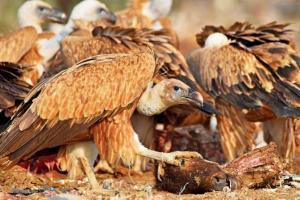Undercover operation by environmental organisations and universities finds diclofenac is still being sold by veterinary pharmacists

Griffon Vultures feeding on a carcass. Pic/ Nikhil John
The Royal Society for the Protection of Birds' (RSPB) Centre for Conservation Science, the Bombay Natural History Society (BNHS), Bird Conservation Nepal, IUCN Bangladesh and the University of Cambridge, have made an important finding about a drug that is harmful to vultures. It has come to light that more than a decade after being banned, a drug toxic to vultures is still being prescribed in pharmacies across India. This was found in an undercover investigation led by a group of environmental organisations and universities.
ADVERTISEMENT
In 2003, the widespread veterinary use of a non-steroidal anti-inflammatory drug (NSAID) diclofenac in cattle was discovered to be decimating the Asian Vulture after entering its food chain.
According to a press release, this caused 99.9 per cent of white-rumped vultures and 97 per cent of long and slender-billed vultures to be wiped out - a staggering 40 million birds – pushing these birds to the brink of extinction. Soon India, Pakistan, Nepal and Bangladesh banned the drug from veterinary practice.
"Yet cattle carcasses in India continue to be found containing potentially lethal concentrations of diclofenac along with contaminated, dead vultures," said the press release.
'Posed as livestock owners'
'The new study published recently in the journal Bird Conservation International, set out to identify what NSAIDs were being offered for sale for veterinary use. From 2012 to 2017, members of the research team visited pharmacies and asked for drugs to treat their injured cows, buying the first drug that was offered.
Dr John Mallord, the lead author of the study, said, " As the sale of diclofenac for veterinary use is illegal, if we were open about the reasons for the survey, and that we were vulture conservationists, pharmacists would be unlikely to offer us diclofenac. We had to pretend to be livestock owners so we could get an unbiased picture of its availability."
In five Indian states surveyed in the final year, 2017, diclofenac was still being offered by 10-46% of pharmacists. Chris Bowden, Programme Manager of Saving Asia's Vultures from Extinction (SAVE), said, "In Nepal there is evidence that vulture populations have begun to recover, but in India they either continue to decline or, at best, are stable, but at low levels and not yet showing signs of a recovery."
'Need more bans'
Vibhu Prakash, Deputy Director of BNHS said, "Where there is robust scientific evidence that drugs are toxic to vultures, governments should implement bans on their veterinary use. This will require extensive safety testing of a range of drugs, which will also discover further vulture-safe NSAIDs, which will give farmers and veterinarians a choice, in addition to meloxicam."
Keep scrolling to read more news
Catch up on all the latest Mumbai news, crime news, current affairs, and a complete guide from food to things to do and events across Mumbai. Also download the new mid-day Android and iOS apps to get latest updates.
Mid-Day is now on Telegram. Click here to join our channel (@middayinfomedialtd) and stay updated with the latest news
 Subscribe today by clicking the link and stay updated with the latest news!" Click here!
Subscribe today by clicking the link and stay updated with the latest news!" Click here!






